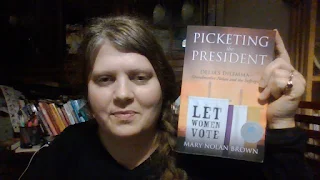Picketing the President: Delia’s Dilemma—Grandmother Nolan and the Suffragists by Mary Nolan Brown is an uplifting, quick read about a young woman learning to admire her suffragist grandmother. It’s 1919, and Delia’s been sent to Washington, D.C., with Mrs. Nolan, essentially as a companion. Women’s right to vote is finally being seriously considered after decades of activism, but suffragists are still being arrested for protesting, still being sent to jail.
The book is delightful, however. The suffragists support
each other and are unwavering in their cause—but still individuals, not instantly
predictable. Mrs. Nolan is a complex woman: a long-time
suffragist even though she’s a Southerner, her Catholic faith makes her
entirely opposed to the new birth control options that some of the suffragists advocate.
Mrs. Nolan doesn’t see this as any sort
of conflict of interest, however, and she’s prepared to fight for women’s suffrage
even to her death—of which there’s some likelihood. She’s in her 70s and not entirely well, but
she returns to jail and participates in the hunger strike that so many suffragists
carry out while being detained. Such a
woman of principle! Ms. Brown lets us
see her through Delia’s eyes—as Delia is also finding new friends and a beau
her grandmother disapproves of—and I can imagine Ms. Brown hearing these
stories from Delia herself.
My favorite part, however, was when the suffragists took the
train from inhospitable Washington, D.C., to Charleston, S.C., where, to my
astonishment, the Charlestonians treated them with true Southern hospitality,
providing them spaces to make their speeches, practically parading them about. Being from South Carolina, born and college-educated
in Charleston, I was thrilled to read that. (Though now that I think about it,
Charleston might not have felt so welcoming if they’d stayed there,
protesting on and on!)
I picked up this wonderful little novel at the Amelia Island
Book Festival, excited to see both it and Ms. Brown, who for a short time
attended one of my writing groups in Savannah.
I’d been enthused about the story when she was working on it, years ago,
and I’d really hoped she would publish.
Now she has, and the novel even won 2nd place in the CIPA
EVVY Indie book contest. It’s an inspiring
book, well worth your time.

No comments:
Post a Comment